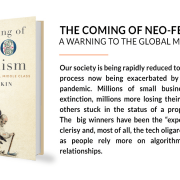The Never-Ending Threat of Utopia
Robert Grant Price reviews The Coming of Neo-Feudalism
Feudal times are here again. This is a thesis Joel Kotkin hammers to a fine point in The Coming of Neo-Feudalism, a clarifying study-of-the-moment presented as sweeping history.
The idea behind the book is simple: Kotkin says the social hierarchy of the Middle Ages closely traces the lines of today. If our society continues down the current path of economic disparity and social disintegration, the feudalism we left behind will return. With force. And it will be the middle class, the benefactors of liberal capitalism, who will suffer most.
Oligarchs sit atop Kotkin’s neo-feudal order. No Charlemagnes among this crowd, the new kingly class is composed of technology-obsessed nerds—the Mark Zuckerbergs and Jeff Bezoses of our age who hold a disproportionate percentage of the world’s wealth and who will grow wealthier in the coming decade. According to Kotkin, these elites—“long on brilliance, but short on hardship”—want to shape the world to reflect their progressive politics. They have the resources to accomplish these dreams, with plenty left over to spend on their extracurricular ambitions, like the transhumanist dream to upload human consciousness into the cloud.
The chokehold tech oligarchs have on the fortunes of others distinguishes them from industrial oligarchs of the past century. In the future, upward mobility will be harder to achieve, contrary to the claims of the techno-utopians and extreme capitalists. Instead of creating opportunities for the underclasses to gain wealth and compete with them, the tech oligarchs favor what Kotkin calls “oligarchic socialism”: schemes like Universal Basic Income that secures this self-dealing overclass from having to pump their vast fortunes into creative capitalism—or employees’ paychecks. Taxes collected from the lower classes will be redistributed to give the most basic support to the lower classes. Get ahead? No, we’re just getting by.
With their commitment to technological determinism, a growing comfort with surveillance of everyone but themselves, and a spiritually vacuous view of humanity, the oligarchs make fine villains, for Kotkin. So do the clerisy, “the new legitimizers” of Kotkin’s neo-feudalism. Where the Middle Ages had the Church to teach social values and shape culture, neo-feudal times have academics, teachers, bureaucrats, and consultants to build a stairway to a new and better heaven. Up, up these stairs we travel by redefining words, standards, and sin to suit the oligarchic mindset, repressing intolerance in the name of tolerance, and evangelizing a new, green, corporate-approved catechism. Kotkin offers the inversion of popular culture as one striking bit of evidence for how the clerisy spreads its gospel: “Cultural creators are inclined to gear their products not so much to the tastes of the mass market as to the particular concerns of the clerisy.” These new clerics serve the masters, but there is no separate “church” to which both oligarchs and commoners need to orientate their conduct, no sense that each will be judged, even if only in the next life. Here, an external standard of judgment is harder to find, other than perhaps “efficiency” or “freedom,” standards whose definitions are in the hands of the oligarchs themselves. Here, the new church is everywhere.
Below the clerisy toil the yeomanry (the middle class) and the serfs (today’s jobbers in the gig economy). The decline of homeownership—in some cities, the impossibility of home ownership for anybody but the wealthy—and the discrediting and dissolution of the nuclear family condition today’s yeomen for serfdom. Despair awaits the middle class, should they find their jobs automated, their debts unserviceable, and their cities unaffordable. Despair always lurks at the edges of fortune, but in the future Kotkin envisions, escape from despair is impossible. Class divisions will look more like strata in a caste system than rungs on a ladder.
Clinging to the lowest rung are the working class, the serfs in the neo-feudal world. Like serfs of the old feudal order, they will live lives fleeced of fortune and certainty. The difference is that today’s serfs have better drugs to dampen despair.
Read the rest of this book review at The University Bookman.






 licensed from Shutterstock
licensed from Shutterstock Thomas Hawk
Thomas Hawk